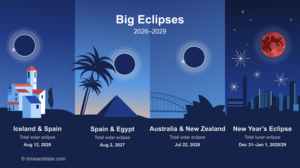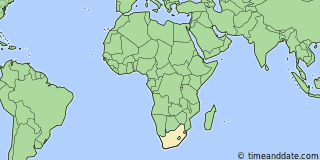| Current Time: | Sep 10, 2025 at 5:43:27 pm |
|---|---|
| Moon Direction: | ↑ 109° East |
| Moon Altitude: | -49.7° |
| Moon Distance: | 226,669 mi |
| Next New Moon: | Sep 21, 2025, 9:54 pm |
| Next Full Moon: | Oct 7, 2025, 5:47 am |
| Next Moonrise: | Today, 9:53 pm |
Moonrise, Moonset, and Phase Calendar for Langebaan, January 2025
Scroll right to see more
| 2025 | Moonrise/Moonset | Meridian Passing | ||||||||
|---|---|---|---|---|---|---|---|---|---|---|
| Jan | Moonrise | Moonset | Moonrise | Time | Distance (mi) | Illumination | ||||
| 1 | 6:51 am | ↑ (121°) | 9:38 pm | ↑ (242°) | - | 2:18 pm | (81.0°) | 236,148 | 3.0% | |
| 2 | 7:59 am | ↑ (115°) | 10:16 pm | ↑ (248°) | - | 3:12 pm | (76.5°) | 234,279 | 8.0% | |
| 3 | 9:07 am | ↑ (109°) | 10:49 pm | ↑ (255°) | - | 4:03 pm | (70.8°) | 232,777 | 15.2% | |
| 4 | 10:14 am | ↑ (101°) | 11:19 pm | ↑ (263°) | - | 4:51 pm | (64.3°) | 231,624 | 24.4% | |
| 5 | 11:20 am | ↑ (93°) | 11:48 pm | ↑ (271°) | - | 5:39 pm | (57.4°) | 230,798 | 35.1% | |
| 6 | 12:26 pm | ↑ (85°) | - | - | 6:26 pm | (50.4°) | 230,266 | 46.6% | ||
|
|
- | 12:17 am | ↑ (279°) | 1:33 pm | ↑ (77°) | 7:15 pm | (43.7°) | 230,026 | 58.3% | |
| 8 | - | 12:48 am | ↑ (287°) | 2:42 pm | ↑ (69°) | 8:06 pm | (37.6°) | 230,104 | 69.6% | |
| 9 | - | 1:23 am | ↑ (294°) | 3:53 pm | ↑ (63°) | 9:01 pm | (32.7°) | 230,558 | 79.8% | |
| 10 | - | 2:04 am | ↑ (299°) | 5:04 pm | ↑ (58°) | 10:00 pm | (29.3°) | 231,455 | 88.4% | |
| 11 | - | 2:53 am | ↑ (303°) | 6:12 pm | ↑ (56°) | 11:02 pm | (27.7°) | 232,843 | 94.7% | |
| 12 | - | 3:50 am | ↑ (305°) | 7:14 pm | ↑ (56°) | Moon does not pass the meridian on this day. | ||||
| 13 | - | 4:54 am | ↑ (304°) | 8:06 pm | ↑ (58°) | 12:03 am | (28.1°) | 234,730 | 98.6% | |
|
|
- | 6:00 am | ↑ (301°) | 8:49 pm | ↑ (62°) | 1:01 am | (30.4°) | 237,060 | 99.8% | |
| 15 | - | 7:07 am | ↑ (296°) | 9:25 pm | ↑ (68°) | 1:55 am | (34.1°) | 239,704 | 98.6% | |
| 16 | - | 8:11 am | ↑ (289°) | 9:55 pm | ↑ (74°) | 2:44 am | (38.9°) | 242,486 | 95.1% | |
| 17 | - | 9:11 am | ↑ (283°) | 10:21 pm | ↑ (81°) | 3:29 am | (44.5°) | 245,195 | 89.8% | |
| 18 | - | 10:08 am | ↑ (276°) | 10:46 pm | ↑ (88°) | 4:11 am | (50.3°) | 247,612 | 82.9% | |
| 19 | - | 11:04 am | ↑ (268°) | 11:09 pm | ↑ (95°) | 4:51 am | (56.3°) | 249,526 | 74.8% | |
| 20 | - | 11:59 am | ↑ (261°) | 11:34 pm | ↑ (102°) | 5:30 am | (62.2°) | 250,770 | 65.9% | |
|
|
- | 12:55 pm | ↑ (255°) | - | 6:10 am | (67.9°) | 251,219 | 56.5% | ||
| 22 | 12:00 am | ↑ (108°) | 1:52 pm | ↑ (249°) | - | 6:51 am | (73.1°) | 250,811 | 46.9% | |
| 23 | 12:29 am | ↑ (114°) | 2:50 pm | ↑ (243°) | - | 7:36 am | (77.8°) | 249,552 | 37.2% | |
| 24 | 1:03 am | ↑ (119°) | 3:51 pm | ↑ (239°) | - | 8:23 am | (81.5°) | 247,519 | 27.9% | |
| 25 | 1:43 am | ↑ (122°) | 4:52 pm | ↑ (236°) | - | 9:15 am | (84.2°) | 244,859 | 19.2% | |
| 26 | 2:31 am | ↑ (124°) | 5:50 pm | ↑ (235°) | - | 10:10 am | (85.3°) | 241,781 | 11.7% | |
| 27 | 3:28 am | ↑ (124°) | 6:44 pm | ↑ (237°) | - | 11:08 am | (84.8°) | 238,552 | 5.7% | |
| 28 | 4:33 am | ↑ (122°) | 7:31 pm | ↑ (240°) | - | 12:05 pm | (82.5°) | 235,438 | 1.7% | |
|
|
5:41 am | ↑ (118°) | 8:12 pm | ↑ (246°) | - | 1:01 pm | (78.5°) | 232,710 | 0.1% | |
| 30 | 6:52 am | ↑ (112°) | 8:48 pm | ↑ (252°) | - | 1:55 pm | (73.1°) | 230,565 | 1.3% | |
| 31 | 8:01 am | ↑ (104°) | 9:20 pm | ↑ (260°) | - | 2:46 pm | (66.6°) | 229,127 | 5.2% | |
| * All times are local time for Langebaan. They take into account refraction. Dates are based on the Gregorian calendar. Illumination is calculated at lunar noon. | ||||||||||
Jan | Feb | Mar | Apr | May | Jun | Jul | Aug | Sep | Oct | Nov | Dec
Elsewhere on mungfali.galihkartiwa07.workers.dev

4 Eclipses Not to Miss 2026–2029
Some eclipses, like this month’s partial solar eclipse, can be very elusive. We’ve compiled a list of upcoming eclipses you can get to in real life.

Skywatching Tips for September 2025
What’s up in the day and night sky in September 2025, including a Blood Moon and a partial lunar eclipse.

Moon Guide for September 2025
Discover the phases of the Moon in September 2025, plus a total lunar eclipse and the New Moon partially eclipsing the Sun.

Full Moon Names
Ancient cultures gave names to the Full Moon. These names are still in use today.
